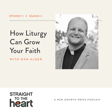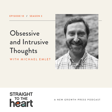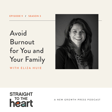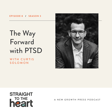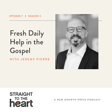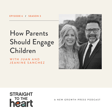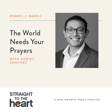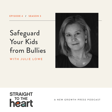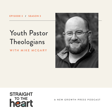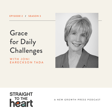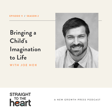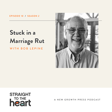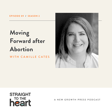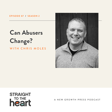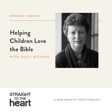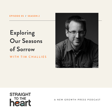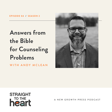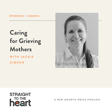Connecting Children to Heritage
00:00:00
Speaker
you know, whether it's through food or customs or language, you know, we have tried, not perfectly by any means, but we've tried to do as much as we can to connect them to that site of their heritage. And I think in connecting with my birth family now, that's been obviously in a helpful way accelerated that to some degree for my kids.
00:00:23
Speaker
I'm Rush Witt, and you're listening to Straight to the Heart, a podcast from New Growth Press. Each episode includes interesting talks with Christian writers, theologians, and friends. We hear who they are, what they think, how they approach their important work in ministry, and the moments and influences that changed their lives.
Introduction to Straight to the Heart
00:00:43
Speaker
Today, I talked with author, counselor, poet, husband, dad, and all-around great friend, Jonathan Holmes.
00:00:51
Speaker
I really mean it. He's the author of The Company We Keep, Council for Couples, Rescue Skills, Rescue Plan, and his newest book on identity issues. Today, I asked Jonathan about his newest book, his important work through leading Fieldstone Counseling Center, and what really makes him happy in life and ministry.
00:01:12
Speaker
We talked about his challenging childhood years as a pastor's kid, as well as his adoption, his Korean heritage, and growing up in the Deep South. Jonathan is a joyful and interesting guy, and I can't wait for you to listen in on our conversation.
Identity Issues in Kids
00:01:30
Speaker
This is Straight to the Heart. And I'm really excited about the book you're writing on identity issues.
00:01:42
Speaker
Yeah. How is it going now, the process? It's good, man. Like I did a little bit of work. I've got, I'm at 20,000 words right now. So yeah. So I'm like at 5,000, like I have content for every chapter like written, like at least three or 4,000 words. So it just seemed to come out. I mean, obviously it means a lot of cleaning up. That's why I sent some of those samples to you and Ruth and Barb to kind of take a look at that. Um,
00:02:10
Speaker
Yeah. I mean, I hope that, I hope that it's helpful and, you know, what you guys would potentially be looking for. Um, I, yeah, so I'm, you know, eager to hear back from Ruth and Barb in terms of, you know, we hate it, we love it, change this or fix this or whatever, but, um, I'm sure it's going to be fantastic. It's chugging, it's chugging, it's chugging along. So.
00:02:33
Speaker
At this point, what do you think is the most meaningful part of it to you as you've been writing through it and thinking about the topic? What really gets you going and what are you really interested in?
00:02:50
Speaker
I'd probably say just like the identity formation process of how do we help kids and teens who are being shaped and formed by our culture in terms of how they think about themselves. How do we kind of come in with this third way of navigating essentially a gospel identity of helping kids understand who they are before the Lord. They're created by God, they're loved by God, they're known by God.
Writing Process and Challenges
00:03:16
Speaker
And really trying to have
00:03:18
Speaker
God's voice parental voice being kind of the loudest voice in their head rather than culture or even their own voice. So trying to kind of carry that theme throughout all the different chapters on gender, sex, athletics, academics. I thought about adding another chapter on like kids who find their identity like in their appearance. But for right now, I just had those like those five big kind of like those five major topics. But
00:03:47
Speaker
Yeah, I did, I did a little bit of survey work too and like reached out to some different people. So I've got some different stories and quotes that I've been able to pull from like real live, you know, parents and human beings, which I think always adds like a nice touch in the book. Like, so you're not only just hearing my voice. So yeah.
00:04:09
Speaker
But it's been all that being said, I think my fear at the front end of like the word count and the timeline, I just think this new system, my mind just seems to be working for me. So I've been able to kind of get it out there on paper.
Poetry vs. Prose
00:04:24
Speaker
Yeah, you were saying the other day that you had settled into a nice routine of maybe 500 words a day, and that works for you. Yes. I haven't stayed, I've fallen off the bandwagon here and there the past few weeks, but pretty consistently every day, I've been trying to read 500 words, I've been trying to read a stack of books next to me that I've been utilizing. It's broken it up into much more doable chunks, which
00:04:51
Speaker
Again, I don't know why I've never done this before, but I'm like, yeah, okay, I think I can do this.
00:05:00
Speaker
Do you, do you enjoy the process of writing? You've obviously written a handful of books so far. Uh, so, uh, what's your, what has your bit process been like on the previous books and do you enjoy the process? Is it kind of a grind to you or? It's a grind. It, well, I'd say the lat like rescue skills and rescue plan was a grind. It was, I think I came into it.
00:05:25
Speaker
I mean, first, there was only going to be one book, and Deepak had told me, hey, I'm going to do the main write on it. You just kind of come back over and do a heavier rewrite, because that's what him and Pierre had done for pastor and counseling. That's the only reason I signed on, because I'm like, great, you're going to do all the heavy lifting. I'll kind of come in and add a couple of quotes here, a Bible verse here.
00:05:45
Speaker
Then he got tied up with that 31 day devotional series of PNR and he was like incapacitated. He's like, Hey, dude, can you, how about you do the first right on it? And then I'll come in and do a heavy rewrite. And I'm like, Hey.
Counseling Through Poetry
00:05:59
Speaker
And then, I mean, the book just kept getting bigger and bigger because he'd be like, Oh, that's great. Why don't we add a chapter on this? Let's add chapter on that. And like, Hey, what if we, so the project just kept on growing. So that one was tough. That one was tough. I mean, not in a bet, like a,
00:06:15
Speaker
it was just hard in the sense of there was a lot of work. The Friendship Book wasn't hard, it was my first book, and I made the mistake of thinking, oh, I did six talks, six talks at a retreat, I'll just turn those into chapters. And Kevin Meath, who was the editor at Cruciform, he was like, yeah, this isn't gonna work. They need a lot of work. You can't just take a sermon as it were and turn it into a chapter. So it was a good learning experience for me.
00:06:44
Speaker
Yeah, what other kinds of writing have you done? Obviously those are trade books, those are counseling oriented books, but you're also, you've been into poetry writing and that's really interesting to me because I really struggle, I struggle with poetry appreciation, I guess maybe you would call it during college.
00:07:08
Speaker
Take a class. I never had poetry appreciation. But you really appreciate poetry. Help me appreciate poetry. Why do you like it?
00:07:19
Speaker
You know, I think it's been something that in high school, I remember her name was Mrs. Scharinga. She was my English teacher my senior year. She was passionate about poetry. And we would read these poems, they'd be like two or three lines. And she could wax eloquently for like 45 to 50 minutes about the meaning binded. And, you know, being the dumb senior in high school, I'm like, how are you getting that, you know, from, you know, two or three lines of poetry.
00:07:46
Speaker
so I don't I think it's been a later appreciation I would say and Here's what I normally tell people when I tell myself for me poetry helps me communicate a feeling or an experience So in a way for me that we're pros or to just talk it out loud conversationally or dialogically there's something about poetry that captures a feeling a memory an experience
00:08:14
Speaker
something that just lies below the surface in just a really beautiful way. So poetry, for me at least, I think people write and read poetry for a variety of reasons, but for me at least, that's been a huge part of it, a huge part of the motivation for me to both read it and write it.
00:08:34
Speaker
Well, that makes a lot of sense because the way that you just described poetry is a very similar description for counseling as someone who loves and values counseling. And how do you see the connection between poetry and counseling, whether it would be utilizing poetry and counseling or just the dynamic of what writing poetry does and what counseling is really about, what spiritual growth is about?
00:09:05
Speaker
Right. I mean, you and I both, yeah, we're both counselors and you know, the irony is probably that so much of our counseling, we push people to poetry and scripture. I mean, Psalms, you know, pretty much the predominance of wisdom literature, you know, is written in poetry, not prose form.
00:09:23
Speaker
And I think sometimes we forget that. We just think of the Bible as the Bible. You know, it's just this propositional truth material, but it means a lot of scripture that we encourage our councilees to read and to engage with is poetry. And I think that's helpful. I think a lot of Old Testament commentators like Derek Kidner and Trumper Longman and
00:09:45
Speaker
Robert Alter have been helpful for me and that of just understanding, you know, just because it's poetry doesn't mean that there's not really rich theological truth and depth in there. You know, it's not just, oh, people are talking about their feelings. There's beauty, there's symmetry, there's parallelism, there's
00:10:04
Speaker
a lot, I think, that can be drawn. And so I think the reason why we tend to assign some of those passages or utilize a lot of those passages in our counseling is because we realize it captures something of the human experience that prose just is a little bit flatter than describing.
Biblical Counseling Journey
00:10:22
Speaker
There's something about how David describes when people are against him,
00:10:28
Speaker
That in poetry form just feels much more alive and active so. You know again i think the irony is we don't talk a lot about poetry and counseling or the use of it but we use it a lot i think in counseling probably unbeknownst to ourselves.
00:10:46
Speaker
I don't think I've ever heard how you came to biblical counseling, what your introduction to biblical counseling was like, and maybe even the role that counseling has played in your life. Ironically, Rush, when I came to the school that I came to at that time, they had just transitioned from more of like a
00:11:06
Speaker
integrative psychology type department into a biblical counseling department. When I had come into the school, like my major was in history and in education, I really wanted to be like a history teacher. But there was something about biblical counseling, which was at least that school's closest analog to like psychology, that that's always been an interest of mine. So I just enrolled in that as a major as well. So kind of major doubled in counseling and in history.
00:11:35
Speaker
but then just really fell in love with the content and the material, the students, the professors. It was, I would say, fundamentally reorienting for me to think about psychology and human motivation and functioning from a biblical counseling perspective. Again, that would not have even been language that I would have
00:11:57
Speaker
Even had would have even been able to articulate i don't think i just thought like this is counseling this is psychology is it worse so my time and undergrad institution i attended was really formative for me my freshman year in chapel david palace and came and talked and i remember.
00:12:16
Speaker
we would have different chapel speakers come through. And I remember one of the faculty members saying something about a guy named Dave Palleson coming in and talking. I'm like, who's David Palleson? I never heard of the guy. And there are a few things I can't remember from my time in chapels, but he spoke in his text was Ephesians 4, 15 through 16, speaking the truth and love.
00:12:38
Speaker
And he just talked about the beauty of interpersonal relationships and friendships as context where counseling per se can happen. And again, to you and I, that probably sounds somewhat like, yeah, yeah, yeah, like we got that at our age and our experience. But you know, for an 18 year old, you know, undergraduate student who had grown up in a fairly
00:12:58
Speaker
you know, see Christians in their church culture, I was, you know, lights just kind of began to click off. I had never heard someone articulate things the way that David had. And I think that kind of just then set me off on a journey into biblical counseling. And obviously, I did not end up as a history teacher. I ended up as a counselor. So God obviously had other plans for which I'm grateful.
00:13:19
Speaker
Was there a time for you when you realized, I need to give my life to this work of counseling? Wherever that would be, leading a counseling ministry as you do now, counseling people in a local church, was there a moment where that dawned on you? Yeah, that's a good question, Rush.
00:13:45
Speaker
When we moved to Ohio from where I was doing undergrad and graduate work with my wife, when we moved to Ohio, we came to a church that we thought was going to be just a little bit of a part-time job for me to kind of do counseling on the side, but the greater part of my job was going to be teaching at a local school. And probably about six weeks into it, our senior pastor had a pretty significant moral failure.
00:14:09
Speaker
And I remember when all of the stuff kind of came out, his wife was really in the dark, didn't know any of it was going on, and the elders said, hey, can you call up so-and-so and sit down with her and talk to her and share all this with her? And again, I'm fresh out of school. I'm like, what? You want me to do what? And I remember that conversation like it was yesterday, Rush. We had our women's ministry coordinator came along with me for the meeting.
00:14:39
Speaker
And I remember very, you know, in a really poor way, probably just kind of fumbling my way through trying to, you know, share what was going on with her husband, with the church. She was obviously devastated, just a massive pile of tissues. I remember it was just next door. And I think I remember coming out of that meeting thinking, I am way in over my head. I'm way in over my head and Lord,
00:15:04
Speaker
Lord help me. And I think that like when I think about counseling ministry, you know, that's probably one of the very first quote unquote appointments I did. I think I realized how much I did not know and how much help I really needed. You know, you come out of, you come out of college and seminary thinking like I got this. Like I know, you know,
Overcoming Pornography Addiction
00:15:20
Speaker
I know all the answers and in that moment I was so reminded that man, you don't know anything. You don't know anything.
00:15:28
Speaker
And if not for the comfort of the Holy Spirit and the leading of the Lord in that woman's life, like you, like, what are you doing? Like, what do you have to offer in that moment? So it was very humbling. It was very humbling. But it was also very, it was very arresting for me in the sense of, man, I need to do a lot of work if this is something that I want to continue to grow in and to make a life in.
00:15:57
Speaker
Rescue Plan and Rescue Skills are two books written by Jonathan Holmes and Deepak Redju, which together can help you chart a course to restore prisoners of pornography. Pronography addiction is a pervasive problem, even in Christian circles. If you want to help someone who has become a prisoner of this sin, you'll need to know your enemy and the terrain on which you'll be fighting.
00:16:21
Speaker
Rescue Plan draws on the research and experience of these two biblical counselors, giving concrete information and helping you to shape an effective plan of attack for strugglers young and old, whether single, dating, or married.
00:16:36
Speaker
And although it can stand alone for maximum effectiveness, Rescue Plan pairs with Rescue Skills, also by Deepak Redju and Jonathan Holmes. You can find Rescue Plan and Rescue Skills everywhere books are sold. You know, on our podcast here, these are organic conversations, so I might put you on the spot here. That's right. What would you say or maybe
00:17:07
Speaker
the most obvious to you, the most obvious, I don't know, maybe two or three.
00:17:13
Speaker
lessons or realizations that came to you in the course of having to minister to people.
Lessons from Counseling
00:17:21
Speaker
And they were just things that you just can't learn by taking a class. You need to really walk with someone and meet them in their experience and their trouble. And that is the way that you get the case wisdom. What were two or three? Did they come to mind for you?
00:17:39
Speaker
big lessons? Yeah, I'd say one lesson I took away was that, you know, in undergraduate and seminary training, I mean, you learn a lot of information.
Counseling as Art
00:17:51
Speaker
I mean, how to help people to ask questions, you know, putting them through an interpretive grid, certain passages of scripture, how to interpret those passages. I mean,
00:18:01
Speaker
You know, you're spending upwards of six to seven to eight years even perhaps getting ready for counseling. And I think that one of the lessons that I learned very early on was just how there is a simplicity to counseling as well that training and simmering can't give you, meaning just the ability to do what we're doing just to have a conversation.
00:18:21
Speaker
and not to feel stilted of like, okay, what do I do next? Okay, so I go to this passage and then I'm gonna ask these two questions and then this takes me here. Like it's some, you know, large flow chart where, you know, where you're, you know, going through a decision tree. Um, I think that's what I thought counseling was going to be. It was just going to be very kind of cookie cutter. We've got eight sessions. We've got the eight eyes. We've got the love, no speak due and just this lovely package that we put together. And I think that the simplicity of counseling of just,
00:18:51
Speaker
resting and listening and being with people was something I wasn't prepared for. I remember when I came to Parkside, after our church went through its transition and Parkside replanted us, we had Ed Welch come out and do a conference for us, which was kind of my first introduction to CCEF at that time. I had signed up for counseling observation with Ed in the School of Biblical Counseling. I remember watching him counsel, and two things came to mind. One was,
00:19:18
Speaker
OK, that's it's very normal what he's doing. It's very simple. I mean, he's just talking to these people. And the second thing was, you know, how do I how do I learn that? How do I grow in that? Because there was such a simplicity to what he was doing. But there was obviously a skill that was underneath that that, like you said, you learn through case wisdom, I think so.
00:19:37
Speaker
a lot of counseling, as you and I both know, is so much experience. It's just, it's doing it. It's failing at it. It's learning lessons the hard way. But a lot of times when you counselors are like enamored with new modalities or theories or techniques that used to, I think in my youth enamored me as well. But now
00:19:59
Speaker
I think what I value is just the simple ability to just sit and listen to people and just have a conversation with them. Which I think generationally and culturally is a skill that is not as well honed and a lot of people just don't use them, don't use those skills very often.
Love for Cooking and Heritage
00:20:19
Speaker
Yeah, I think that's really true. And that's been true to my experience. And actually, what you're saying is interesting because it comes back to the idea, I think, of poetry.
00:20:34
Speaker
Sort of, this probably sounds cheesy, sort of poetry in motion. There's an aspect of counseling that is sort of, it's sort of artistic. It's not simply propositional, just like you said, do this, then do this, then give this, then everything is better. There is a frightening, it's frightening for me a lot of times because I don't really like to be in a situation where I'm not sure what's coming next.
00:21:05
Speaker
And there is that kind of fluidity that's needed to walk with someone and be able to be present. And I think that scares us a lot and probably holds us back from ministering to people because we're afraid. How many times I've heard someone say, I'm afraid I'm going to say the wrong thing. And that's certainly true. It's possible to say the wrong thing. I've said the wrong thing many times to people.
00:21:34
Speaker
But there is that kind of poetry or art. You know, Mike Emlet's book, Cross Talk, helped me to think about that more carefully, about how I could use the Bible and how I could in a more natural way be able to, you know, identify with people and try to try to help them with the same help that I need. You know, yeah.
00:21:59
Speaker
I think that line of counseling being poetry in motion is a really apt way to describe it. It's poetry in motion, it's good jazz music, it's like you and your wife are cooking a meal and she's tasting it and adding something in, you're putting something in, you're adding an ingredient.
00:22:17
Speaker
very much in the moment, walking in the spirit dynamic. I think that happens in counseling that, like you said, can be scary for some people. But I think it's scary because we realize how self-reliant we would like to be to follow a plan, a paradigm, three great principles to reduce anxiety or four great tips to escape depression.
00:22:38
Speaker
You know, I think when you and I, when we read Jesus and the Gospels, we realize that's rarely, if ever, how Jesus counsels or has conversations. There's just, like you said, there's this poetry in motion to where, you know, that is a skill, I think, that over time we develop, that we catch, that we hold as counselors.
00:22:59
Speaker
Yeah, I think that's right. Well, you brought it up a second ago. You know, I really, this is not just podcast talk, Jonathan. You really are an interesting person to me. And I love talking to you for that reason. Oh, that's so kind. I enjoy hearing what you think and being able to talk through these things together. Now you brought up a second ago, the picture of making dinner with your wife.
00:23:26
Speaker
And that's obviously something that you love to do is cook, right? Because I've seen this and this is really another interesting side to you. And what's going on with all of that?
00:23:40
Speaker
And your kids are cooking with you and making cake pots. Yes. What's going on in the kitchen? Yes. Well, you know, like I mean, like any good counselor, right, all of our all of our stuff comes out of some degree our past and our family of origin when I was growing up. But my family grew up fairly poor. We didn't have a lot to make meals. We did a lot of takeout. You know, if you could make a casserole out of it, you know, I've probably had it.
00:24:06
Speaker
I remember thinking to myself, this is getting the job done, but I'm sure food could be much more enjoyable than this. When I went to college, I worked for a catering company to make some money on the side and just started playing around in the kitchen with food and whatnot and watching Food Network and things like that. First of all, I love to eat, so I think it's very utilitarian in that sense. I love to eat. I love a good meal.
00:24:34
Speaker
And there's just something about cooking where I love preparing something for other people, preparing things with people that just is really fun. I'd also say just in all honesty, too, I'm like, as a guy, there are just few things like, you know, a lot of guys are really well versed at sports and athletics. And that was just not something that I ever was gifted at. So I also felt like I just needed, I needed something, I needed something that
00:25:01
Speaker
a hobby to engage in. So for me, cooking just filled that void, whereas sports is that hobby for a lot of other guys. So what was your upbringing like in your family? What was your childhood and those early days in your family like that made you who you are today? Yeah.
Adoption and Childhood Reflections
00:25:24
Speaker
It's, you know, my story is a little bit complicated. It's not unique, though, to, you know, any of your other listeners in terms of the complexities and difficulties that come with growing up, you know, and, you know, some of the maybe distinctions, though, or differences, I'm adopted. So, you know, there's some complexity with that. Grew up in the Deep South. Dad was a pastor, but
00:25:49
Speaker
kind of, we went from church to church. He never really was able, yeah, yeah, grew up as a pastor's kid. But because of his problems, being able to hold down a job in church, and kind of being on the other end of it, it's why I'd always kind of sworn to myself, I would never become a pastor. Like, you know, being on the other side of things, I'm like, God, please, I will do anything except for be a pastor. So that's, you know, kind of the great irony of my life.
00:26:19
Speaker
But I would say for the most part, my childhood was pretty rough. My dad passed away two years ago. My adopted mom is still living, but it's tough and it's a complicated relationship. There's a lot of brokenness there. So I try to be as thoughtful as I can when talking about my past and upbringing.
00:26:39
Speaker
But also realizing and acknowledging, you know, it wasn't this, you know, real pleasant, you know, roses and buttercups type upbringing, where everybody got along. There was a lot of hardship and difficulty. So I think in some ways, when you think about family of origin and counseling, I very much am somebody who
00:26:57
Speaker
you know, in their adulthood was trying and is trying to kind of recreate a childhood that I didn't have and respond to some of the brokenness and difficulties of my upbringing. And that's where, you know, counseling, you know, my family and people who have poured into my life have been, you know, God's instruments of like grace, you know, along the way in that process.
00:27:22
Speaker
So where in the Deep South did you grow up and what was particularly rough?
00:27:32
Speaker
Well, I mean, yeah, for your listeners, I grew up in this really, really tiny town when I first came over called McRae, Georgia. Really, really small town. Eventually we moved to like a suburb of Savannah called Hinesville. So right off of the coast. Early on in life, my parents divorced. And so my mom stayed there in the Hinesville, Brunswick area. My dad moved back to his hometown of McRae. So I would kind of spend the weeks with my mom.
00:27:59
Speaker
And then the weekends with my dad, they eventually got back together, divorced again multiple times. So again, a little bit of a rough story there.
00:28:08
Speaker
I'd say in terms of the challenges, you know, I have a picture of my kindergarten class, and half the class is black, half the class is white, and right in the center of the picture is this little Asian American kid, you know, in the middle of the picture. And there's a Confederate flag on one side, American flag on the other side. And that was, yeah, that was my upbringing. It was very, you know, it was racially
00:28:32
Speaker
It was a racially charged environment. Again, I understand that a lot of things have changed since the 80s, but that was very much the dynamic. You grew up realizing you obviously look different than any other person around. I never saw anybody else who looked like me in those early days.
00:28:51
Speaker
But, you know, those old adoption narratives of, hey, we don't see you as anybody different than us. You look just like one of us. You know, you're trying to deal with that tension of you're hearing your parents tell you that, but then physically you look around and you're like, but nobody else really looks like me. So, yeah. What were your friendships like growing up in school or in the neighborhood?
00:29:14
Speaker
Yeah, you know, friendships were pretty tough. We moved around a lot when I was a kid. So we moved around Rush probably, oh gosh, 15, 20 times in like eight to 10 years. So I think early on, I just tried to
00:29:31
Speaker
blend and adapt because i knew like it's not really worth trying to invest in good friendships as it were so i would say like most of my friendships honestly i don't think really formed in deep and until i leave high school and college you know college i would say a lot of my friends who you know still to the stand consider lifelong friends you know i think there's something about that collegiate for your residential life that just
00:29:58
Speaker
Really facilitates those deep meaningful friendships and i'm so grateful to the lord for bringing those people into my life and, you know, in some ways i think brought a lot of healing and restoration to a to a childhood in early elementary childhood that you know felt very lonely at times so.
00:30:18
Speaker
I'm very happy to tell you about the CSB Life Council Bible, Practical Wisdom for All of Life. The CSB Life Council Bible, developed in partnership with LifeWay and New Growth Press, is designed to equip readers with biblical truth and counsel on a wide range of topics and tough life issues related to relationships, marriage, parenting, and more.
00:30:43
Speaker
The Bible is full of useful tools and resources for life application and discipleship grounded in the truth of the gospel of grace. The CSB Life Council Bible includes more than 150 full-length articles from respected Christian counselors and scholars. Article contributions come from David Pallison, Ed Welch, Amy Baker, Mike Emmlet, Elise Fitzpatrick, Diane Langberg, and many more.
00:31:12
Speaker
And the Life Council Bible includes over 100 word studies focusing on key words from the Bible applicable to personal healing, growth in counsel. The CSB Life Council Bible features the highly readable, highly reliable text of the Christian Standard Bible. The CSB captures the Bible's original meaning without sacrificing clarity, making it easier to engage with Scripture's life-transforming message and to share it with others.
00:31:42
Speaker
Visit NewGrowthPress.com today to learn more about the CSB Life Council Bible. Practical wisdom for all of life. So your dad had a hard time keeping those ministry jobs going and so you were involved in church though as you moved around and how did you become a Christian?
00:32:06
Speaker
My dad had a difficult time holding down jobs. We were always kind of moving from small Southern Baptist Church to Southern Baptist Church in the Deep South. I would say we were the type of family that was at church pretty much anytime the doors were open. So I mean Sunday morning, Sunday night, midweek services, definitely grew up in that type of culture.
00:32:27
Speaker
and i think what is eventually bread at least within me i'm not saying this happens for everybody was just very much like a works based righteousness so if you would ask me it like a young age like hey like why do you think you're going to heaven i would probably given you some type of answer related to well i'm a good person.
00:32:46
Speaker
I go to church, I read my Bible, I don't cuss, I don't drink, I don't smoke. I'm just a good person. And I would say later on, like early high school, I just got to a spot where, again,
00:33:01
Speaker
There wasn't a real relationship with the
Reconnecting with Korean Roots
00:33:03
Speaker
Lord. It was just more to do points and I think I got really disillusioned by that I got saved my sophomore the summer in between my freshman and sophomore year our church was at a summer camp and The the speakers were talking about true repentance
00:33:20
Speaker
And I remember the whole week, they're talking about, you know, repentance from sin, et cetera. And again, being a good person, I'm like, well, what do I have to, like, I don't have anything to repent from, you know, I'm a good person. And they really ham, yeah, I'm righteous. And they really hammered that home. And I think that entire week, I really did feel like the tug of the Holy Spirit on my heart of just like, you're, you're not, you're not regenerate. You're not a Christian. You're just going through the motions because you're a pastor's kid. But I had such deep shame and embarrassment about being a pastor's kid.
00:33:49
Speaker
and everybody thinking that I'm a Christian, then I'm like, well, I can't go forward, you know, at the high school camp and like, quote unquote, get saved. So, you know, I held out, you know, tried to quench the working of the Holy Spirit, I think, in my life. But, you know, on Thursday night, you know, I went forward. And I think I would say, at least in my thinking, and as I look back in my history, that really was the time that I think I truly gave my life over to the Lord. And then I think over time, like moving into college,
00:34:17
Speaker
it really did begin to crystallize, and I realized just how dependent on my own works my salvation had been. So, you know, one particular passage of Scripture that was like a pivot point for me was the parable of the prodigal son, and when I was at college, went to Grace Community out in California, and John MacArthur at that time was teaching through Loop 15. And, you know, all of my growing up, I always thought, yeah,
00:34:47
Speaker
The brunt of this parable is about a really bad kid who goes out and does some bad stuff and comes back and the father accepts him. The preaching of the word oftentimes does. My eyes were just open to realize that the focus of that parable really is on the older brother and his refusal to enter into the joy of the father over the recovery of lost sinners and just his self-righteousness, his dependence on his own work to
00:35:13
Speaker
Be right with the father and I just realized man. I that's me. I think that was me growing up I was the older brother and It was very convicting. So yeah, so in some ways I'd say my Christian faith really began there like that summer of high school But really grew and developed from that point, you know up until now so
00:35:35
Speaker
Well, you've given me a lot to think and pray about. All five of my kids are pastors' kids. And so, you know, I think that's a common struggle for everybody and the way that you've described kind of the context where you grew up. Places like that really make for some difficult ministry because
00:35:54
Speaker
It does, you know, a kind of feeling of righteousness in ourselves because of what we've done really has a lot of power to assure us or to put on some blinders and we just don't see as clearly or hear what we need to hear until the Lord breaks through. And so it's really, it's wonderful to hear the way the Lord broke through to you.
00:36:21
Speaker
given those struggles. I mean, struggles in your family and moving around a lot and, you know, a lot of friends, but still involved in your local church, which was faithful to take you to this camp and for you to hear. It's really a wonderful testimony.
00:36:38
Speaker
I want to go back for a second to your adoption. I'm just curious if your parents, you know, talked to you about the process of your adoption and sort of what life was like for them that led them into that decision. You know, that's, that's, that's a decision. And what was that like for them?
00:36:58
Speaker
Yeah, my my understanding of it rush is that my mom, my mom struggled with infertility and they weren't able to have kids. And so, you know, like a lot of other couples out there who, you know, dearly and deeply desired children adoption, adoption really was a grace in their life to be able to have a family. I think, too, I try to give my parents a lot of
00:37:22
Speaker
Grace and credit in the sense of how adoption was talked about and how it was viewed and how it was handled in the early 1980s looks a lot different than it does now. A lot of the things that we know about children who come out of traumatic settings or come out of orphanages or
00:37:40
Speaker
really traumatic foster care situations a lot of that information just was not available to them so when my parents adopted me I mean they never they never went to Korea they never did a home study they didn't do any type of cultural you know learning or education
00:37:55
Speaker
I flew over with a flight attendant from Delta Airlines. My parents went to Atlanta International Airport, picked me up, and drove me home. It just looked so much different. Nowadays, when I hear people talk about adoption, it's like the studies and the culture visits and the language learning. Again, I don't want my parents for that at all. They, I think, did the best that they could with what they had.
00:38:22
Speaker
But looking back on it now, a lot of adoptees who kind of came out of Korea in particular in the 80s, which was kind of the height of the big push for adoption here in the States. It is fascinating, though, how many commonalities a lot of those adoptees share. And just in terms of reconnecting with their cultural and ethnic backgrounds and some of the difficulties and challenges of growing up in conservative evangelical spaces where you really didn't see anybody who
00:38:50
Speaker
like you for the majority of your life.
Growth of Fieldstone Counseling
00:38:53
Speaker
I've talked about adoption in different settings before.
00:38:57
Speaker
I try to just share with people, you know, my story does not have to be every Doppie story. I know that there are a lot of adoptees out there who are in loving families and have really positive experiences. And I would say, yeah, there is a lot of positives with mine. There are some difficulties with mine. So, you know, like in counseling, like we tell people, you know, everybody's story is unique. And just getting to know each of those stories can be helpful in just expanding out our case wisdom and understanding of people in general.
00:39:26
Speaker
And there's a God who works all things for good. And that's a theme in your story. How has your cultural and ethnic background, I need to say that more clearly. How has your cultural and ethnic background influenced you to this day, or even your family, whether it's traditions or things that you're observing and valuing as a family?
00:39:51
Speaker
Yeah, it's a good question. I think that, you know, again, I've talked about this in other places, but probably about two years ago, I was able to reconnect with my birth family through a DNA test. And I would say that's been a huge component for me of really reconnecting with a lot of my like cultural and ethnic background, customs, language, etc. So for my kids, you know, who are half Korean, half white,
00:40:20
Speaker
I wanted to, I think in some ways recreate and offer a lot of what I felt like was at least missing in terms of that cultural connection. So, whether it's through food or customs or language, we have tried, not perfectly by any means, but we've tried to do as much as we can to connect them to that side of their heritage. And I think in connecting with my birth family now, that's been obviously in a helpful way accelerated that to some degree for my kids.
00:40:50
Speaker
It's been a wonderful, a wonderful grace from the Lord, for sure. That's really great. That's awesome. How have you seen your kids value that influence those lessons learning about their own heritage? Yeah. I mean, they're over the moon about it. I mean, my kids
00:41:12
Speaker
I think I've always had questions about, you know, my own story of adoption and, you know, what does it mean to be Asian American here in the States? And so I think for them, it's been like a crash course educationally in culture. And they've just soaked it up. I think that, you know, there's an understandable sense of
00:41:30
Speaker
excitement and pride and their Korean heritage and ethnicity that belonging to a larger family now here in the States has brought them into. So it's a wonderful point of discussion for us. I think the other neat thing for us is that together with my kids, we've been able to learn and do this journey together because it seems to be happening in real time. So that's been another neat aspect of it as well. That is neat.
00:42:00
Speaker
Tell me a little bit about Fieldstone counseling and what ministry is like for you there. How do things work in your counseling center?
00:42:11
Speaker
Yeah, yeah. So Fieldstone is an independent counseling center that kind of grew out of the counseling ministry that we have launched at Parkside. And so Fieldstone is about six years old, and we're based here in Northeast Ohio in terms of brick and mortar locations. And when we started, we thought primarily that our audience would be Northeast Ohio, but just through God's providence,
00:42:35
Speaker
He's grown Fieldstone. We have counselors now both here in Northeast Ohio and across the country through telehealth and remote counseling. We see people in all 50 states, 20 different countries. And really I would say Fieldstone is a story of just I think God's blessing and
00:42:54
Speaker
just the need, the immense need that there is out there right now for solid biblical gospel-centered counseling. When we started, we had, I think, probably four or five people that were going to offer counseling through Fieldstone, and we had no clue if we'd have five councilees or 50 or 500. And I would say, six years into it, the need is just enormous. So there are many days where I feel really overwhelmed and
00:43:22
Speaker
unprepared for just the amount of need that we're facing. But then I'll hear stories from our counselors and from our counselors of just how God is working in their children's lives, their churches, their elder teams, their marriages. And that definitely gives me energy for the day. So we would love to be of help and service to people all across the country, across the globe. Our mission
00:43:50
Speaker
is that we offer lasting hope for life's hardships, and I would say a derivative of that mission as we've grown is that we want anybody anywhere in the world to be able to have access to biblically-based gospel-centered counseling.
Reasons for Counseling and Gospel Hope
00:44:04
Speaker
So that's what we've been doing over the past six years.
00:44:08
Speaker
We make a lot of mistakes. We try to learn from those mistakes. We try to grow and stay humble and dependent on the Lord. But it's definitely a job that I'm eager to come to pretty much every morning, which I'm thankful for.
00:44:24
Speaker
I could ask you a hundred questions about it just because it would help me. You know, it always helps me to hear how counseling goes, um, in other places, uh, among other people. But, um, one question I think is important and helpful is in your experience in your counseling center, what do you find is the, the kind of ultimate provocation that leads someone to
00:44:52
Speaker
uh, reach out for counseling or come to the counseling center. What's the thing that sort of nudges them over the line? Cause it's a big decision, you know, to, to reach out for counseling. What do you think is that that final nudge for a lot of people? Because, uh, you're thinking, do I need counseling? Should I, should I have some, some extra help with this or that? What do you think is, what do you see as that?
00:45:18
Speaker
That's a great question. And you know, if you ask me that question on another day, I might give you a different answer. But I guess what comes to my mind now is
00:45:28
Speaker
Just a sense of I'm at the end of my rope, just a lack of hope. A lot of people, because of the resources that are available to them now through the internet and social media and self-help books, it's like, okay, let's try as many things as we can. Let's throw everything up on the wall. Better communication, life coaching, read the self-help book, believe in myself more, more date nights. It's like, okay, we'll try everything. And then there is this nagging sense of, man,
00:45:58
Speaker
something is still not right why is this so hard and it's that sense of just coming to the end of your road coming to your sense of just realizing like me and i think i need somebody else i think i need somebody to help me see something differently confront me speak truth in my life.
00:46:15
Speaker
speak truth and love to my spouse, you know, more often than that, like not me, but my spouse. So I think that a lot of people make the plunge into counseling for that. It's just at its core, it's just a hopelessness of, hey, we've looked at everything that the world has to offer. We've looked at all of the internal resources we possess, and we are still coming up short. To which I would say, amen. Like that is, that is then the perfect pathway then for the gospel of, yeah, you have utter need,
00:46:44
Speaker
And that utter need can be met in Jesus Christ. And so for me, that's where I think what we do here at Fieldstone and what so many other Gospels and your counseling centers get the privilege of doing is just in the brokenness of people's lives, just coming into that brokenness and offering true hope in Christ. When this episode comes out, there may be people that see Fieldstone as a good opportunity or good option for them. What would be the best way to get involved in counseling?
00:47:13
Speaker
for someone who is over that line. They feel the nudge. No, thank you for that, Rush. They could go to our website. It's www.fieldstonecounseling.org, fieldstonecounseling.org. All the information about how to pursue counseling is available on our website. One of the unique things about Fieldstone is that we don't charge a fee. We ask for a suggested donation.
00:47:37
Speaker
So what that means is that people, regardless of their financial ability to pay, are able to receive gospel-centered counseling.
Influences and Joy in Life
00:47:45
Speaker
And so you can get more information about how to pursue that on our website, and it would be our honor to come alongside you and to be of help. So you've studied at Masters University, Trinity,
00:47:58
Speaker
Seminary, CCEF, and you're part of the Biblical Counseling Coalition. I'm curious in all of that time, if you could, I know it's a hard question to answer, but if you could narrow down to your top three influences, I mean, that's like telling your top five NBA, you know, or who the greatest of all time, obviously, is Michael Jordan. LeBron James, LeBron James.
00:48:29
Speaker
Who are your top three influences that really made an impact on you? Yeah, yeah. I mean, not just counseling, but just life in general, I would say, you know, one of them is our mutual friend that we have. His name is Joe Keller. And Joe, at the time when I was at Masters, was the Dean of Student Life. And so much of my spiritual life, I think, really began at Masters in terms of just discipleship and friendship and people pouring into me. And Joe was a huge part in that.
00:49:00
Speaker
In many ways, I've told people he is like a father to me. He's not old enough to be my father, but he's like a father to me. He is old enough. He's an older man. He'll appreciate that. He is an older man. But I just never had somebody really take me under their wing and just live life with me and just be there in the good, the bad, the hard, and the rough times. So he's been a huge influence in my life.
00:49:26
Speaker
did my wife nice commercial counseling we you know we talk on the phone least once a week you just as a huge presence in my life. I'm second you know honestly would be as well you know it has been i would say very formative in my understanding of of counseling and.
00:49:44
Speaker
Counseling is friendship counseling is conversation counseling is just the ordinary Means of grace that we live out in the church where we're talking to people sharing meals with people praying with people Doing hospital visits just the again to borrow his term just the side-by-side nature of life in the church The way that Ed thinks I know can sometimes be odd for some people, you know, you know trying to follow his thinking but I
00:50:09
Speaker
For me, it's like a rainbow. There's always treasure at the end. If you can track with him and understand where he's going, the way that he sees scripture come to life is just remarkable and it's been so helpful for me in my own journey.
00:50:27
Speaker
It's a third person. This third person is not obviously a throwaway or like I'm just saying this, but genuinely my wife. In terms of growing up with not good relationships, either parental or friendships, I genuinely don't think I knew how to be in a relationship where
00:50:47
Speaker
I would get called out of my sin and my selfishness and my impatience and my need for control more so than obviously in a relationship like I have with my wife. And to have somebody stick with me in the midst of my
00:51:03
Speaker
sin, my immaturity, my, you know, everything, um, and still love me and pursue me and want to be with me. I mean, you, you know, you and I both know as great men. That's a, that's a remarkable thing. It's a, it's a, it's a, it's a Christ like thing. You know, you just can't do it on your own. So, um, so she, you know, I'm mentioning her third, but she definitely has to be at the top for sure. So she's your Michael Jordan. Yeah. LeBron James.
00:51:33
Speaker
Yeah. Yeah. Maybe maybe a last question, but it's a big one. I've really been trying to think more carefully and deeply about happiness. I have been influenced a lot over recent years in thinking about the role of happiness in the Christian life and its counterpart with holiness, the way that holiness and happiness, in a sense, are two sides of the same coin.
00:52:02
Speaker
They interact with each other. That true holiness is to find our satisfaction and happiness in God. And true happiness is to know and receive the righteousness and holiness that God gives to us by grace and that we continue to walk in. So I've been thinking a lot about that, the role of happiness in life. And it's helped me to hear other people that I look up to and admire.
00:52:31
Speaker
answer the question, what really in your life makes you happy? What is making you happy in this piece of life in ministry?
00:52:43
Speaker
Yes, yes, yes. Well, I would say my go-to answer that is genuinely true, I would say, is my family, my kids. And the reason why I say that is because, you know, again, we talked a lot about my background, my upbringing. The idea of, you know, when I would read passages in Scripture like in Zephaniah 3.17 where it says, the Lord delights over his children. He exalts over them with gladness. I would kind of read that and be like,
00:53:10
Speaker
I'm like, okay, I know that theologically to be true, but I don't, I truly don't think I really understood that until I had kids. And again, do my kids have problems? Absolutely. Are they sinners? Absolutely. Do they drive me nuts at times? Absolutely. But the pure delight and joy I have in my children.
00:53:28
Speaker
I love them so much. And then for me, that has given me an immense analog then to the delight that God has over me, over his children, which again, I would never have thought of God like that. God is a righteous judge. He is this very distant, far away person that we worship. But the idea of God exulting and covering and delighting and rejoicing over us
00:53:54
Speaker
as children, that was just a foreign concept for me. So then in having children, I have found so much joy and happiness in being a father, having children, being an imperfect father for sure, but helping me I think better understand God's love for me than in some small measure hopefully can get shown to my children through me. Yeah, that's a beautiful answer to the question. It's very helpful.
00:54:23
Speaker
Um, yeah, it's, uh, it's been an important question to me, uh, so much lately. And even in counseling too, it's something that's started to kind of flavor my, my counseling and other relationships, certainly, you know, parenting, just like you said, because so much of my earliest days, uh, in counseling is that there was, uh, for me, this emphasis on, um, you know, obedience and life change.
00:54:54
Speaker
And there was this sense that maybe happiness or being too focused on happiness could get in the way of that. So, you know, I heard and I said a lot of things like, God is not concerned about your happiness. He's concerned about your holiness. And I'm just seeing more as I, you know, talk to people like you and have my own experience in my relationship to God and in my family, just like you said,
00:55:23
Speaker
that I'm seeing a different way of understanding the Christian life than I have understood it for many of those years. And the example of parenting and our desire for our children to be genuinely happy, not just to give them, you know, give them cotton candy and make them happy, you know, and hyper. But, you know, really genuinely happy. And it's such a reflection then of the way that just as you said, God delights in us and
00:55:53
Speaker
I think that's just super important to biblical counseling and not to be lost, something to be guarded because we want counselors to really know the happiness that God has by grace in their lives and to rejoice in Him because He is delighting in us in a way that only He can.
00:56:17
Speaker
Yes, I think I second that heartily and say amen because I think if we could bring that into our counseling more, I think it could be immensely helpful that the Lord is a God who's mighty to save, who rejoices over us, who, you know, as he looks at Christ, he says, this is my beloved son in whom I'm well pleased. And that sense of delight and pleasure and happiness, I think could go a long way in helping people in their faith journey.
00:56:48
Speaker
You've been listening to Straight to the Heart, a podcast from New Growth Press. Our next episode releases next week, and I look forward to seeing you there.

